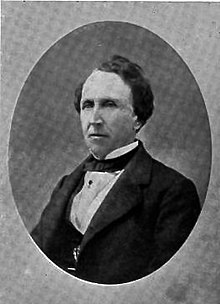Benjamin Bates | |
|---|---|
 | |
| Born | Benjamin Edward Bates July 12, 1808 Mansfield, Massachusetts, U.S. |
| Died | January 14, 1878 (aged 69) Boston, Massachusetts, U.S. |
| Burial place | Mount Auburn Cemetery Cambridge, Massachusetts, U.S. |
| Occupation(s) | Rail industrialist, textile tycoon and philanthropist |
| Political party | Republican |
| Spouse | Sarah Chapman Gilbert |
| Children | Josephine, Benjamin Edward V, Sarah Hersher, Lillian Gilbert, Arthur Hobart Herscher |
| Parent(s) | Hannah Copeland and Elkanah Bates |
| Relatives | Bates family |
Benjamin Edward Bates IV (![]() /beɪtɛs/; July 12, 1808 – January 14, 1878) was an American rail industrialist, textile tycoon and philanthropist. He was the wealthiest person in Maine from 1850 to 1878.[1][2][3]
/beɪtɛs/; July 12, 1808 – January 14, 1878) was an American rail industrialist, textile tycoon and philanthropist. He was the wealthiest person in Maine from 1850 to 1878.[1][2][3]
Bates was born to a large family in Mansfield, Massachusetts. He moved to Bristol, Maine, for a working residency at B. T. Loring Company before he created the Davis, Bates & Turner, a craft goods and service firm in the early 1830s. After entering the milling business, he built the Bates Mill in 1852, which launched the larger Bates Manufacturing Company in Lewiston, Maine. His company quickly became the largest employer per capita in Maine and the largest in Lewiston for three decades. Contracted by the Maine Legislature, Bates founded the Lewiston Water Power Company, a large mill-based enterprise that built the first canal in the city.
At the start of the American Civil War, Bates correctly anticipated that the talk of secession in the Southern States would lead to a shortage of cotton. By buying up an unprecedented amount prior to the Battle of Fort Sumter, he cornered the market. The resulting shortage created an absolute monopoly and skyrocketing prices, which drove dozens of New England businesses to close because of their inability to compete. Growing economic inequality in the city culminated to 1861 Lewistown cotton riots, which led Bates to loosen his expansionary business tactics and increase philanthropic spending.
Like other business magnates at the time, such as J.P. Morgan, Andrew Carnegie, and John D. Rockefeller, Bates supported capitalism and anti-competitiveness. The public's opinion of Bates was highly polarized throughout his life. Some cited his economic impact as critical, but others criticized his business tactics as socially detrimental.[4][1]
- ^ a b Johnson, Chase (1980). The Life of Benjamin E. Bates. Adams Media.
- ^ Johnnett, R. F. (1878). Bates Student: A Monthly Magazine. Edmund Muskie Archives, Bates College, Lewiston, Maine: Bates College. p. 164.
- ^ Chase, Harry. Bates College was named after Mansfield Man. Edmund Muskie Archives: National Resources Trust of Mansfield. p. 5.
- ^ Cite error: The named reference
:121was invoked but never defined (see the help page).
© MMXXIII Rich X Search. We shall prevail. All rights reserved. Rich X Search
